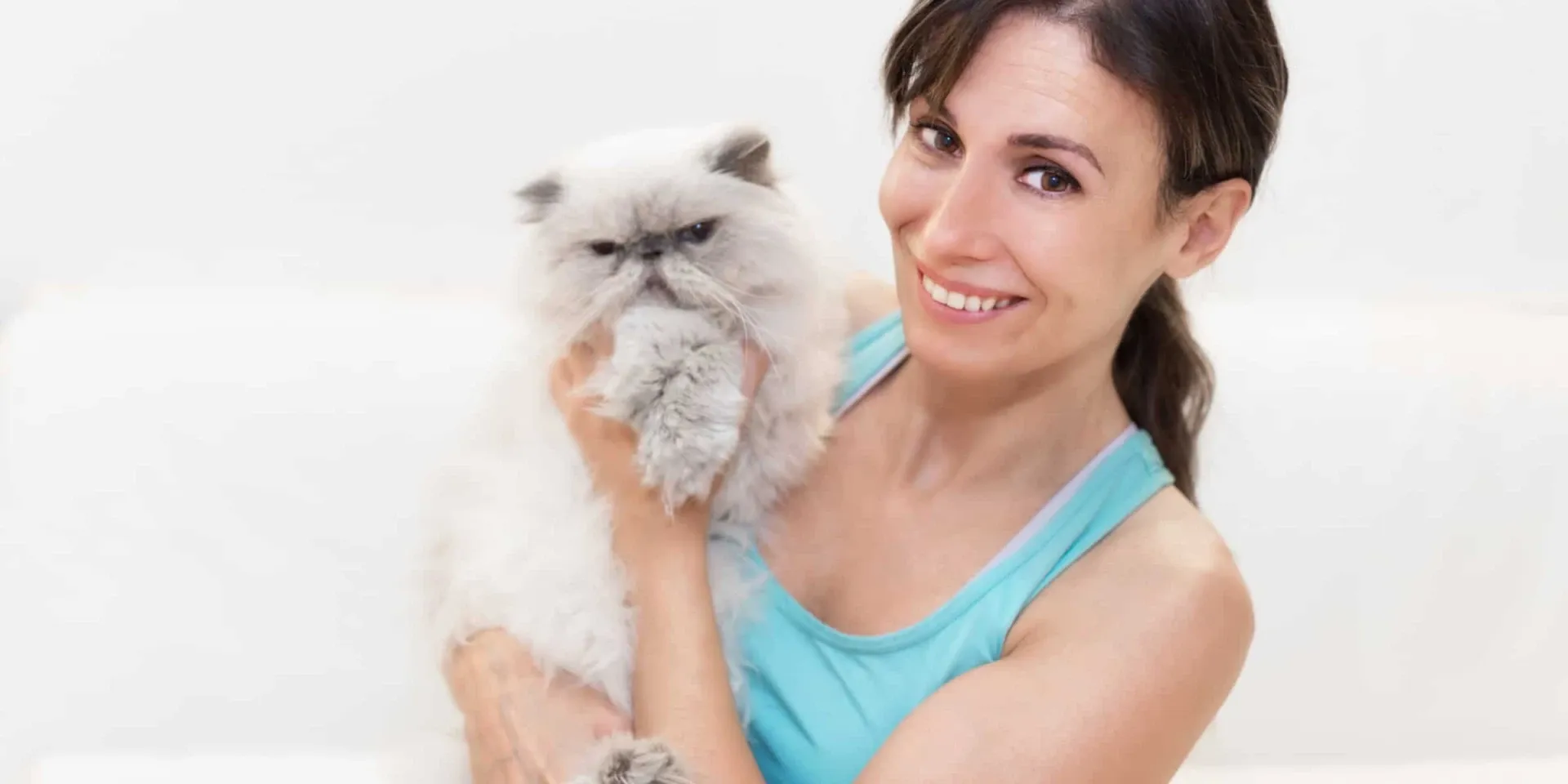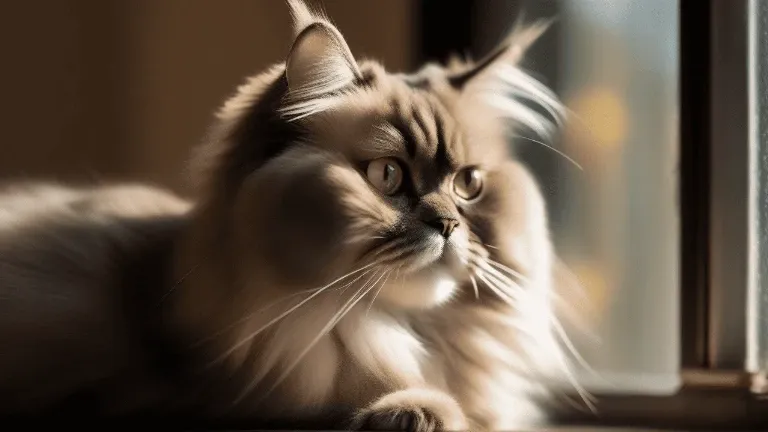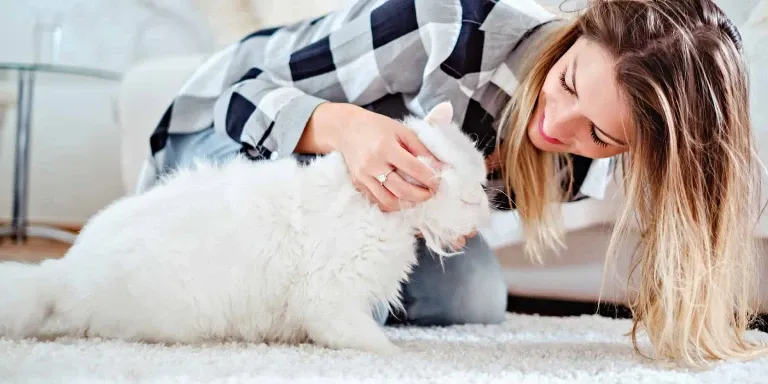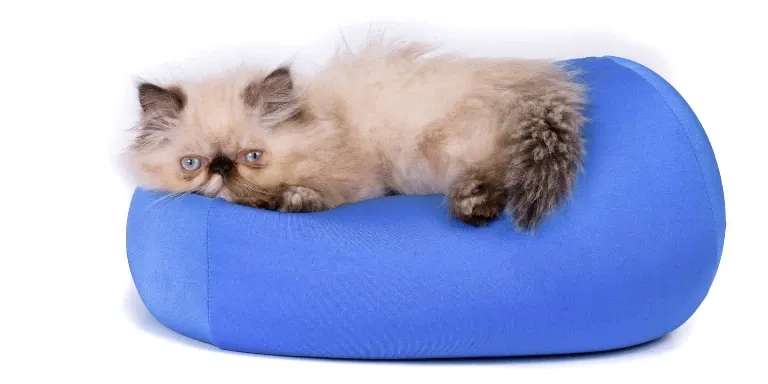The Best Fluffy Pancakes recipe you will fall in love with. Full of tips and tricks to help you make the best pancakes.

As a pet owner, you want to feel that special connection with your furry friend. You want them to be loyal, affectionate, and attached to you. But does your Persian cat feel the same way? Do they form strong bonds with their owners or do they simply tolerate their presence?
Persian cats can form strong attachments to their owners and are known for their affectionate and loyal personalities. They enjoy spending time with their owners and can become very dependent on them for attention and affection. However, like any cat, their personalities and behaviors can vary depending on their individual temperament and experiences.
In this article, we will explore the question of whether Persian cats get attached to their owners and what factors can influence the strength of that attachment. Persian cats are known for their luxurious coats, charming personalities, and laid-back demeanor. They are often described as regal, elegant, and affectionate. But what makes them tick? Do they have the capacity for emotional attachment or are they just aloof creatures who prefer to keep to themselves?
Understanding the personality traits of Persian cats is the first step in answering this question. From there, we can delve into the importance of socialization, the role of owner interaction, and the signs of attachment that Persian cats exhibit. So, let’s get started and discover whether your Persian cat is truly attached to you.
The Personality Traits of Persian Cats
If you’re looking for a feline companion with a gentle and laid-back personality, you can’t go wrong with a Persian cat – they’ll make themselves right at home with you.
These cats are known for their calm and affectionate nature, and they love nothing more than lounging around with their owners. They have a reputation for being one of the most relaxed breeds of cats, and they’re perfectly content to spend their days napping and cuddling.
Persian cats are not only known for their sweet personalities, but also their unique quirks. They can be quite playful and mischievous, yet they still retain their calm and patient demeanor.
They are also known for their love of grooming, and they will spend hours licking their fur to keep it clean and soft. This habit can sometimes lead to hairballs, so it’s important to keep up with regular brushing and grooming to avoid any problems.
Overall, Persian cats are a wonderful breed for anyone looking for a loyal and laid-back companion. They are known for their affectionate nature, and they often become very attached to their owners.
With their sweet personalities and unique quirks, it’s easy to see why Persian cats are so popular. If you’re looking for a furry friend that will always be by your side, a Persian cat might just be the perfect choice.
The Importance of Socialization for Persian Cats
Proper socialization is key to helping your furry feline friend become a well-adjusted member of your household and feel like a part of the family. Persian cats are known for their independent and aloof nature, but with proper socialization, they can become affectionate and loving pets.
The benefits of early socialization cannot be overstated, as it helps your cat develop social skills, build confidence, and form positive associations with people and other animals.
To socialize your Persian cat, start by exposing them to new experiences and environments at a young age. Introduce them to different people, animals, and objects, and reward them with treats and praise for positive behavior. As your cat grows older, continue to expose them to new experiences and reinforce positive behavior.
However, if you are adopting an adult Persian cat, socializing them may require more patience and effort, as they may have already developed negative associations or fears.
If you are socializing an adult Persian cat, it is important to start slow and be patient. Allow your cat to approach new people and experiences at their own pace, and reward them with treats and praise for positive behavior. Use positive reinforcement techniques, such as clicker training, to help your cat learn new behaviors and associate them with rewards.
With patience and consistency, even an adult Persian cat can become a well-adjusted and affectionate member of your family.
The Role of Owner Interaction in Attachment
Interacting with your furry friend on a regular basis is essential for fostering a strong bond and attachment between you and your Persian cat. Persian cats are known for their affectionate and loving nature, and they thrive on human interaction. Consistent interaction with your cat not only helps to strengthen your bond, but it also provides mental stimulation and socialization for your furry friend.
Neglect can have a significant impact on your Persian cat’s attachment to you. If your cat feels ignored or neglected, they may become distant and less affectionate. This can lead to behavioral issues, such as aggression or destructive behavior.
By consistently interacting with your cat, you can prevent these negative effects and ensure a happy and healthy relationship with your furry friend. The role of owner interaction in attachment is crucial for Persian cats. Consistent interaction not only strengthens the bond between you and your cat but also provides mental stimulation and socialization.
Neglect can have negative effects on your cat’s attachment, leading to behavioral issues. By prioritizing interaction and providing love and attention, you can foster a strong and loving relationship with your furry friend.
Signs of Attachment in Persian Cats
As an owner of a Persian cat, you may wonder if your furry friend is attached to you. Signs of attachment in Persian cats include vocalization and attention-seeking behavior, such as meowing or following you around the house.
They may also seek physical contact and affection, such as snuggling up next to you or rubbing against your leg. Observing these behaviors can indicate a strong bond between you and your Persian cat.
Vocalization and Attention-Seeking Behavior
When you’re their chosen human, Persian cats will often meow and purr like a love song, eagerly seeking your attention like a moth to a flame. They’re known to be vocal creatures, and their meows can convey different emotions such as hunger, boredom, or loneliness. Some Persian cats may even develop a unique meow that they use exclusively with their favorite human.
Aside from their vocalization, Persian cats may also exhibit attention-seeking behaviors such as following their owners around the house, trying to sit on their lap, or rubbing themselves against their legs. These behaviors can be endearing, but they can also become overwhelming if your cat starts to demand attention at inconvenient times.
To manage these behaviors, you can try vocalization training to teach your cat to meow less frequently, or separation anxiety management to help them cope with being alone. Remember, the key to a healthy relationship with your Persian cat is to provide them with the attention and care they need while setting clear boundaries for both of you.
Physical Contact and Affection
Getting up close and personal with your furry friend is a great way to strengthen your bond. Cuddling and petting can make your Persian cat feel loved and secure. Persian cats are known to be affectionate creatures that crave attention and physical contact from their owners. They enjoy being stroked, petted, and held close, often purring contentedly in response.
In addition to cuddles, Persian cats also enjoy playtime with their favorite toys and grooming routines. Spending time grooming your cat not only helps to keep their coat shiny and healthy, but it also provides an opportunity for physical contact and bonding.
By engaging in these activities regularly, you can deepen the connection between you and your Persian cat. Creating a strong and loving relationship that will last a lifetime is possible.
Attachment vs. Dependency
The bond between Persian cats and their owners is one of attachment, not dependency, and it’s heartwarming to see how much they truly care for each other. Unlike dependency, attachment is a healthy emotional connection that allows both the cat and the owner to thrive.
Persian cats are known for their independent nature, but they still crave attention and affection from their owners. When they form an attachment, they become more engaged, playful, and loving.
To understand the difference between attachment and dependency, it’s important to establish healthy boundaries. Persian cats are capable of forming emotional bonds without becoming clingy or needy. They enjoy spending time with their owners, but they also value their alone time and personal space. As long as the bond is based on mutual respect and trust, the cat will feel secure and content.
When a Persian cat forms an attachment with their owner, it creates a beautiful dynamic that benefits both parties. The cat becomes more affectionate, loyal, and trusting, while the owner gains a companion who brings joy and comfort into their life. As long as the relationship is built on a foundation of love and respect, the bond between a Persian cat and their owner can last a lifetime.
Factors That Can Affect Attachment
When it comes to factors that can affect attachment between Persian cats and their owners, there are a few key points to consider.
Firstly, your cat’s health and age can play a role in their attachment to you. Older cats or those with health issues may have a harder time forming attachments.
Additionally, changes in environment or routine can also impact attachment, as cats tend to thrive on stability and consistency. It’s important to take these factors into account when trying to build a strong bond with your feline friend.
Health and Age
As Persian cats age, they may face common health issues such as arthritis or kidney disease. These health concerns can affect their mobility and energy levels, but they still remain attached to their owners.
Persian cats are known to form strong bonds with their owners, and this attachment does not diminish with age or health issues. Despite their health concerns, Persian cats still enjoy being around their owners and seek affection.
As they age, they may require more care and attention, but this can strengthen the bond between the cat and their owner. It is essential to monitor their health and provide proper care to ensure their comfort and well-being.
By doing so, Persian cats can continue to enjoy their golden years with their loving owners.
Changes in Environment or Routine
You may not realize it, but even small changes in your environment or routine can have a big impact on your feline friend. Persian cats are known for being attached to their owners, and any changes in their environment or routine can cause them stress.
For example, if you’re planning on traveling with your cat, it’s important to prepare them for the journey. Getting them used to their carrier in advance, and making sure they have their familiar bedding and toys with them can help ease their anxiety.
Moving with pets can also be a stressful experience for Persian cats. They may feel disoriented in a new environment, and it may take them some time to adjust. It’s important to provide them with their own safe space in the new home, complete with their familiar toys, bedding, and scratching post. Limiting their exposure to the new environment at first, and gradually introducing them to new rooms and areas can also help ease their transition.
Remember, Persian cats thrive on routine and familiarity, so any changes should be introduced slowly and carefully.
Building a Strong Relationship with Your Persian Cat
By showering your Persian cat with affection and creating a cozy space for them to relax in, they’ll quickly become your loyal companion, always by your side like a warm and comforting blanket.
To build a strong relationship with your Persian cat, it’s important to incorporate training methods and playtime activities into your daily routine. Training methods such as positive reinforcement and clicker training can help your cat learn new behaviors and tricks while also strengthening the bond between you and your furry friend.
In addition to training, playtime activities such as interactive toys and puzzle feeders can provide mental stimulation and physical exercise for your Persian cat. By engaging in these activities with your cat, you’re not only providing them with necessary stimulation but also showing them that you care about their well-being. This can further strengthen the bond between you and your cat and help them feel more attached to you as their owner.
Remember, building a strong relationship with your Persian cat takes time and effort. By consistently showing them affection, incorporating training methods and playtime activities into your routine, and providing a comfortable and safe environment for them to relax in, you can create a strong bond with your cat that’ll last a lifetime.
Can a Persian Cat’s Feelings Affect Their Attachment to Their Owners?
Yes, Persian cats have deep feelings and can form strong attachments to their owners. These cats are known for their affectionate and loyal nature, and they can become quite attached to the people who interact with them regularly. Understanding and addressing their persian cats’ feelings can strengthen the bond with their owners.
Conclusion
Congratulations on learning about Persian cats and their attachment to their owners! As you have discovered, Persian cats have distinct personality traits that can affect how attached they become to their owners. Proper socialization and interaction from their owners can greatly impact the level of attachment a Persian cat develops.
But how can you tell if your furry friend is truly attached to you? Look for signs such as following you around the house, snuggling up to you, and seeking your attention. It’s important to note that attachment is not the same as dependency, and allowing your cat to have independence is crucial for a healthy relationship.
As you continue to build a strong relationship with your Persian cat, keep in mind that factors such as age, past experiences, and health can affect their attachment to you. But with patience, love, and proper care, you can develop a bond that lasts a lifetime.
So go ahead and enjoy the company of your furry companion, and ask yourself, “What can I do to strengthen our attachment?”








